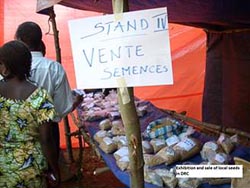In South Kivu province of DR Congo, seed systems for most crops are almost non-existent. As a result, a large share of the seed being planted is obtained from open air grain market or derived from previous year’s harvest. The good news is that the situation is slowly changing. Through N2Africa, farmers are increasingly becoming aware of the benefits accruing from using quality seeds. In the absence of government initiatives and lack of private players in production of quality seeds of various crops, N2Africa, in collaboration with a local research institution INERA-Mulungu and the active local NGOs SARCAF, DIOBASS and PAD, have initiated community-based seed production groups in 13 action sites and 4 satellite sites of N2Africa. The groups are largely constituted by women farmers with an initial focus on producing soyabean seeds. The aim is to give farmers access to improved seeds of preferred varieties and to encourage them to incorporate more grain legumes in the farming systems in order to increase yield and agro-ecosystems health. In addition, it is a strategy to ensure the continued availability of quality seeds after the end of the project.
In this endeavor, seed production has been adopted as part of the delivery and dissemination activities. Seed producer groups are informed on the importance of using improved seeds, trained on good crop husbandry practices, postharvest handling and storage of seeds as well as seed marketing. Through this approach, about 66 tons of soyabean seeds of various varieties have been produced. Many more seed growers, the majority being women groups, are taking advantage of the availability of inoculants and fertilizers to improve soyabean yield and securing large multiplication field through land consolidation. Due to lack of reliable outlets, the produced seeds are marketed at seed fairs organised by the project partners, during field days, and at designated stands in various local markets. These approaches have allowed a rapid circulation of soyabean seeds between households and communities.
 |
 |
Left: N2Africa technicians inspecting a consolidated soyabean seed multiplication field at Mushinga site. Right: A stand displaying improved seed of soyabean varieties at a local market at Murhesa |
Some challenges and way forward
Despite the good progress of seed production and supply to farmers there are some challenges. The majority of women farmers who are motivated to produce seeds, do not have sufficient land to qualify for seed production due to the current land tenure system, which restrict them from owning land. However, this challenge is slowly overcome by farmers consolidating their land for seed production and hiring land from institutions such as churches. Another challenge is unavailability of breeder/ and or foundation seed to rejuvenate old stocks. In this case, N2Africa is working to link seed producers with SENASEM, the national seed certifying agency, and INERA-Mulungu, who has agreed to maintain the breeder seed and provide seed producers with foundation seed. However, this requires heavy investments. Furthermore, effort is under way to organize the selling of seeds in small packs of 1 kg to give the majority of farmers access improved seeds.
By Adrien Chifizi, Jean Marie Sanginga and F.P. Baijukya
